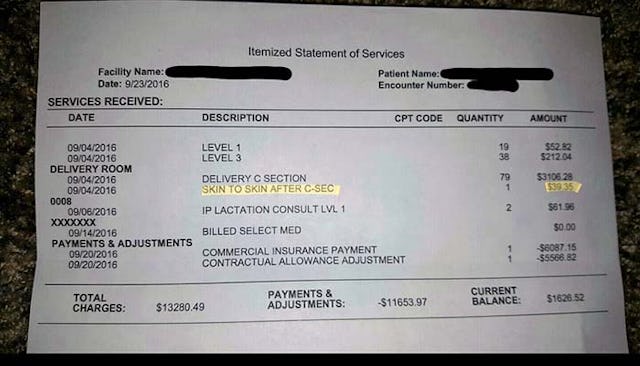Couple Charged For Holding Baby Skin-To-Skin After C-Section Here In The United States Of Crazy

Reddit user shares pic of hospital charge for holding baby after delivery
In the world where wonders never cease we find Reddit user Halfthrottle and his wife, who shared a bizarre charge they found on their hospital bill after her c-section last month. It seems that, along with paying for the delivery and a visit from a lactation consultant, they were also charged for holding their baby. In some ways we’re shocked, but then we remember getting charged $300 for a band-aid and Neosporin once when we took our son to the ER, so we’re also not so shocked.
In a thread titled “I had to pay $39.95 to hold my son after he was born,” a father shares a picture of his bill that does, indeed, show a charge for “skin to skin after c-sec.” Just…what…how the…but then…and also, huh? Call us crazy, but shouldn’t that kind of thing be a freebie? We hope to God they didn’t try to kiss him or they’re going to have to sell their house.
Image via Reddit/Imgur
Here’s how the father explained it on Reddit: “During the C-section the nurse asked my wife if she would like to do skin to skin after the baby was born. Which of course anyone would say yes to…The nurse let me hold the baby on my wife’s neck/chest. Even borrowed my camera to take a few pictures for us…We just noticed it in the bill today and had a laugh.” In response, a labor and delivery nurse tried to explain why this might have happened:”…doing ‘skin to skin’ in the operating room requires an additional staff member to be present just to watch the baby. ‘Skin to skin’ in the OR is a relatively new thing and requires a second Labor and Delivery RN to come into the OR and make sure the baby is safe.”
That explanation still seems ridiculous, but one can kind of understand it when thinking about liability issues, etc, which are also our fault because Americans love suing people. Man, do we love a good suing. This situation isn’t the doctor’s fault, or the nurse’s fault, or even the hospital’s fault — it’s the way our insurance companies work in a healthcare system that is completely and utterly screwed up. Any American who has had a baby knows how out of control the charges can be. One Reddit user who had twins described some of her bills: “I have twins but when I was pregnant my ultrasounds were billed double ‘fetus’ and ‘additional fetus’. I believe my section also cost double which annoyed me because you don’t have to prep and cut me twice. Just reach back in and grab whoever is left!!”
And when we compare our costs to the costs of folks in other parts of the world, it’s enough to drop your jaw forever. To put the original poster’s $1600 balance in perspective, here’s what a couple of Canadians said they paid for their children’s births:
“Canadian here, our singleton came out to $12.”
“Mine was free! Oh, wait, we had to pay $8 for parking.”
Redditors from outside the U.S. are appropriately bewildered by the whole thing. Said one, “The last thing we would want is for a new pair of parents to become homeless because the birth is so expensive. I don’t understand how anyone in America can have kids. No parental leave, no decent daycare, 13,000 dollars to give birth. Have you all won the lottery or something?”
WE WISH! It’s easy to forget how messed up our system is until you talk to people from other countries. As one European put it: “You guys. This is ridiculous. You’re the only country in the developed world who doesn’t have state-funded health care services. How you can’t seem to think this is a basic human right is beyond me.”
WE KNOW, RIGHT?! This charge for skin-to-skin contact is another example of why we need to fix our healthcare system. To his credit, the dad involved does manage to have a positive attitude about it: “Everyone involved in the process was great,” he wrote in one comment, “and we had a positive experience. ”
What a good guy.
This article was originally published on